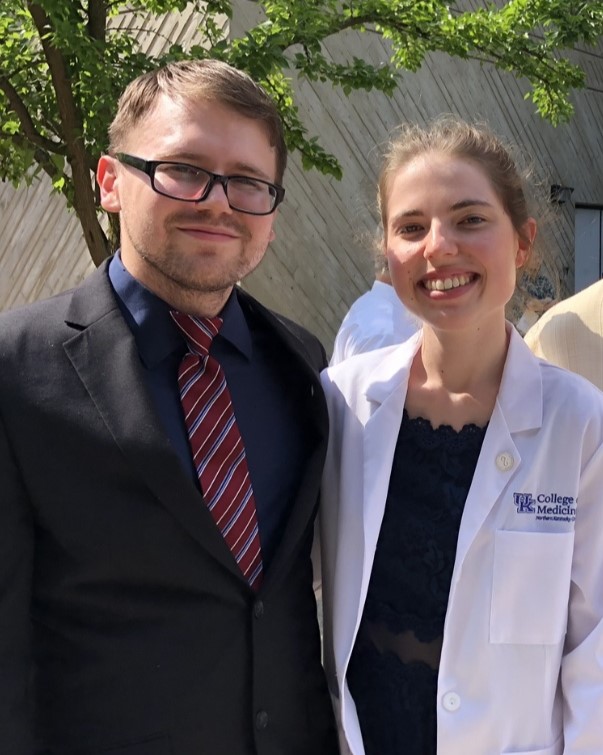Adrianna Brownstead always knew she wanted to be a doctor.
Now a second-year medical student at the University of Kentucky College of Medicine-Northern Kentucky Campus, Brownstead is certain she wants to practice family medicine.
Inspired by the rural area where she grew up, she was drawn to family medicine due to its broad scope and the opportunity to care for a diverse population. The idea of not choosing between treating children or adults appealed to her, as family medicine offered the opportunity to care for a full range of patients, from newborns to the elderly. This versatility, particularly in underserved regions like rural Kentucky where primary care physicians are notably scarce, further reinforced her decision.
Under the guidance of her advisor, Allana Oak, DO, a family medicine physician specializing in obstetrics, she has gained invaluable insights into the field. Shadowing physicians like Brian Shack, MD, at St. Elizabeth Butler's primary care office as part of the scholarly concentration in rural health, she spent 18 eight-hour days immersing herself in real-world medical practice. The hands-on experience interviewing patients and working with attendings to make diagnoses, even when she wasn’t always correct, was crucial in her development as a future doctor. Shadowing Dr. Oak and other physicians has allowed her to observe different approaches to patient care, helping her build confidence in her clinical skills.
Alongside her medical training, she participates in the Health Professions Scholarship Program (HPSP). The program offers a unique opportunity to combine students’ passion for medicine with military service. The HPSP, which doesn’t require prior military experience, allows Brownstead to pursue medical school at no cost, with the opportunity to receive continued training in a military or traditional medical residency following graduation, and then at least four years of military service following residency.
Over the summer, Ensign Brownstead attended Officer Development School (ODS), a rigorous five-week training designed to develop her as a naval officer. Having already been commissioned, she entered ODS as an officer, but emerged with a deeper understanding of what it means to serve as one.
The ODS training covered everything from proper conduct and saluting to the history of the Navy and the responsibilities of an officer. It wasn’t just about learning to wear a uniform correctly but about internalizing the values and discipline required to lead and protect.
The challenges at ODS were not just physical but mental as well. From firefighting drills in intense heat to mastering the use of an oxygen mask in claustrophobic conditions, the training pushed her to new limits. The emphasis on teamwork, especially in life-threatening scenarios, underscored the importance of trust and collaboration among fellow officers. The training was a stark reminder that as a naval officer, her responsibilities extend beyond her medical duties; she is also entrusted with the welfare of her fellow sailors.
One of the most memorable experiences from ODS was participating in the Fourth of July parade in Bristol, Rhode Island—the oldest Fourth of July parade in the United States. Marching in formation, surrounded by fellow Americans cheering "U.S.A." and expressing their gratitude, was a “powerful and humbling experience”, shared ENS Brownstead.
As she continues her medical education, she remains in the Navy Reserves, balancing her studies with her military commitments. This unique combination of experiences has not only honed her medical skills but also instilled in her a profound sense of duty and leadership.
Now, ENS Brownstead has worked alongside two of her classmates—U.S. Army Second Lieutenant, Luis Comas, and U.S. Army veteran of the 101st Airborne Division, Jessica Ashe—to establish the Northern Kentucky Military Interest Group, aiming to help others make informed decisions about pursuing a similar path and furthering interest in military medicine.
